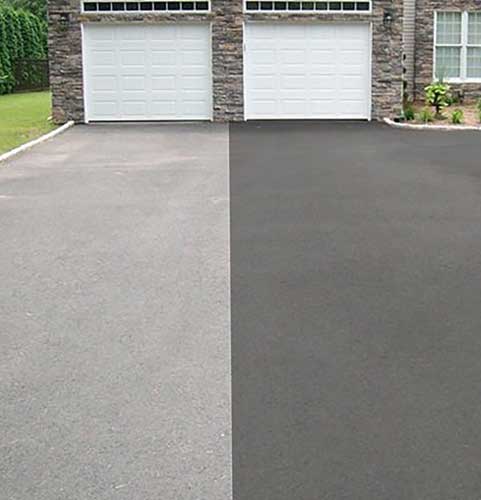Transform Your Home's Appearances: Commercial Car Park Leading and Asphalt Sealing Solutions
Warm Mix Asphalt: A Lasting Solution for Pavement
Warm Mix Asphalt (HMA) has actually arised as a leading sustainable choice for sidewalk remedies, providing a myriad of innovative modern technologies and environmental advantages. As the demand for green construction practices expands, discovering the nuances of HMA's sustainability can provide valuable understandings right into the future of pavement options.
Environmental Benefits of Warm Mix Asphalt

Additionally, Warm Mix Asphalt helps to minimize city warmth island effects. Its dark color takes in sunlight, minimizing the quantity of heat showed back into the environment contrasted to lighter-colored pavements. This can lower ambient temperatures in urban areas, decreasing the demand for cooling and inevitably lowering power usage.
In enhancement, Warm Mix Asphalt contributes to boosted stormwater administration. Its porous nature allows water to penetrate the sidewalk and recharge groundwater supplies, minimizing overflow and the threat of flooding. These ecological advantages make Warm Mix Asphalt a lasting selection for leading roads and highways.
Energy Efficiency in HMA Manufacturing
Is power efficiency a vital consider the production of Hot Mix Asphalt (HMA)? Absolutely. Energy plays a considerable duty in the production of HMA, impacting both expense and environmental sustainability. One vital aspect of power efficiency in HMA production is making use of warm mix asphalt (WMA) technologies (angled parking). WMA permits for the mixing and positioning of asphalt at lower temperatures contrasted to traditional hot mix asphalt, causing lowered power consumption during production. This procedure not just reduces fuel use yet likewise decreases greenhouse gas exhausts, making it a much more eco-friendly choice.
Moreover, developments in plant modern technologies have actually led to more energy-efficient HMA production procedures. By enhancing energy use in HMA production, the industry can minimize its carbon impact while keeping top notch sidewalk products.
Recyclability of Hot Mix Asphalt
The recyclability of Hot Mix Asphalt (HMA) is a critical facet of its sustainability and long-term environmental impact. HMA is among one of the most recycled materials in the USA, with over 100 million lots of recovered asphalt pavement (RAP) being recycled each year in new pavement building and construction. Reusing HMA uses several ecological benefits, such as lowering the demand for virgin products, lowering power usage during production, and lowering the amount of waste sent to garbage dumps.
The process of recycling HMA involves milling the existing pavement, crushing it into smaller sized items, and mixing it with new aggregate and asphalt binder to create a recycled mix. On the whole, the recyclability of HMA plays a considerable role in advertising angled parking sustainable methods within the sidewalk industry.

Long-Term Performance of HMA
Asphalt pavements show sturdiness and resilience over a prolonged duration, reflecting the long-lasting performance of Hot Mix Asphalt (HMA) In addition, developments in HMA innovation, such as the use of polymer-modified binders and warm mix asphalt, have actually even more enhanced the click now resilience and durability of HMA sidewalks. By prioritizing quality building and construction and upkeep practices, HMA proceeds to show itself as a affordable and sustainable option for long-lasting pavement infrastructure.

HMA: Toughness and Sustainability
Showing both resilience and sustainability, Warm Mix Asphalt (HMA) has actually come to be a foundation in the building of durable sidewalk infrastructures - regrading. HMA's sturdiness stems from its capacity to hold up against heavy tons, harsh climate condition, and high web traffic quantities, making it a trusted selection for roads, highways, and airport terminal paths. The make-up of HMA, which generally consists of accumulations, binder, and filler, plays a critical role in enhancing its durability and resistance to deterioration
Additionally, HMA's sustainability depends on its recyclability and energy-efficient production process. The capacity to recycle recovered asphalt sidewalk (RAP) in brand-new HMA mixes lowers the demand for virgin products and reduces the ecological effect of sidewalk building and construction and maintenance. Additionally, the energy effectiveness of generating HMA hinges on its lower blending temperatures contrasted to various other sidewalk materials, resulting in minimized energy consumption and greenhouse gas exhausts.
Conclusion
Finally, warm mix asphalt (HMA) supplies a sustainable remedy for sidewalk with its eco pleasant characteristics. HMA's recyclability, power efficiency in manufacturing, and lasting sturdiness make it a green selection for road building and construction. By preserving natural sources, minimizing waste, and lowering greenhouse gas emissions, HMA plays a critical duty in promoting sustainability in framework growth. Its ability to mitigate city warmth island effects further highlights its importance in developing durable and environmentally conscious sidewalk systems.
HMA is one of the most recycled products in the United States, with over 100 million loads of reclaimed asphalt pavement (RAP) being reused yearly in brand-new sidewalk construction.The process of reusing HMA includes milling the existing sidewalk, crushing it right into smaller pieces, and blending it with brand-new aggregate and asphalt binder to develop a recycled mix.Asphalt pavements additional hints demonstrate sturdiness and strength over an extended duration, showing the long-lasting performance of Warm Mix Asphalt (HMA) Furthermore, innovations in HMA innovation, such as the usage of polymer-modified binders and warm mix asphalt, have better boosted the resilience and durability of HMA pavements. The capability to recycle recovered asphalt sidewalk (RAP) in new HMA mixtures reduces the demand for virgin products and lessens the ecological effect of sidewalk construction and maintenance.